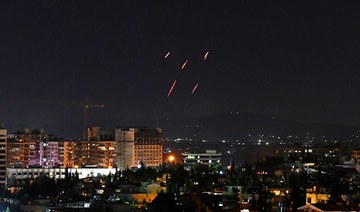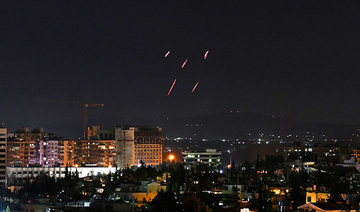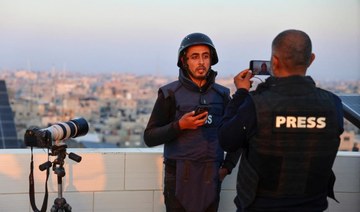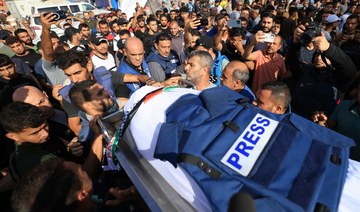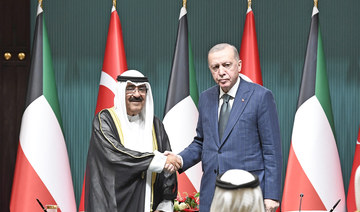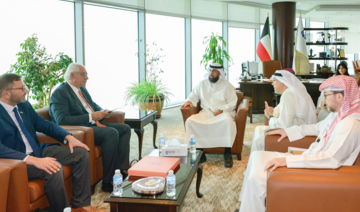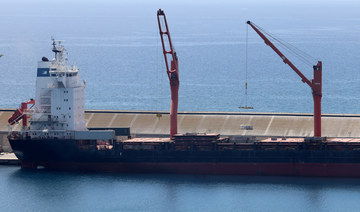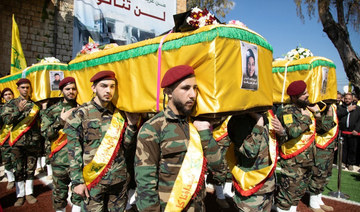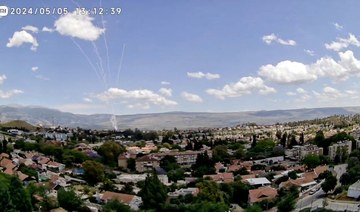JEDDAH: At least 10 people died in a wave of Israeli airstrikes on Wednesday against Iranian targets in Syria.
Fighter jets pounded installations operated by the Quds Force, the elite overseas unit of the Islamic Revolutionary Guard Corps, and by the Iran-backed Hezbollah militia.
The dead included five Iranians from the Quds Force and at least two militiamen, according to the Syrian Observatory for Human Rights, the war monitor in the UK.
Israeli military spokesman Jonathan Conricus said eight targets were hit in areas stretching from the Syrian-controlled side of the Golan Heights to the outskirts of Damascus.
They included an Iranian headquarters at Damascus international airport, a “secret military site” that hosted Iranian military delegations, and the 7th Division of the Syrian armed forces, he said. Syrian surface-to-air defenses were also hit after firing at Israeli planes and missiles.
Israel has regularly attacked Iranian-linked targets in Syria in recent years, but has stepped up strikes this year in what Western intelligence sources describe as a shadow war to reduce Iran’s influence.
But Wednesday’s attacks struck a far wider range of targets than usual, and the Israeli military was more forthcoming about the details than in the past, suggesting a clear aim to send a public message about Iranian involvement in Syria.
Israel said it was retaliating for an Iranian-sponsored operation in which Syrians planted explosives near an Israeli military base in the occupied Golan Heights.
The Quds Force is responsible for supporting Tehran’s allies in proxy conflicts across the Middle East, coordinating Shiite militia fighters in Yemen, Lebanon, Iraq and elsewhere.
The Assad regime has never admitted that Iranian forces operate on its behalf in Syria, only that Tehran has sent military advisers. Western intelligence sources say Israeli strikes have undermined Iran’s military power in Syria without triggering a major increase in hostilities.
Israeli jets hit Iranian Quds Force in Syria
https://arab.news/5ur2r
Israeli jets hit Iranian Quds Force in Syria
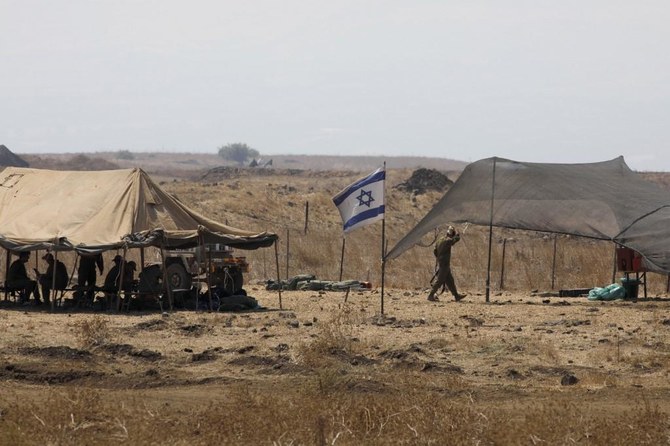
- 10 dead in wave of airstrikes from Golan Heights to Damascus
Arab League affirms its solidarity with Palestinian journalists
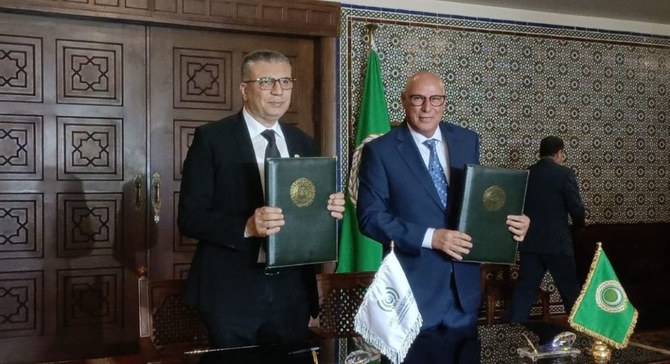
- Ahmed Rashid Khattabi urges global organizations to support freedom of the press
- Khattabi criticized the Israeli authorities for closing down Al Jazeera in Israel and confiscating its equipment
CAIRO: The League of Arab States has expressed solidarity with Palestinian journalists in Gaza, the West Bank, and East Jerusalem, and called for their protection.
May 11 has been designated a day of global solidarity with the Palestinian media as it marks two years since the Israeli occupation forces’ assassination of journalist Shireen Abu Akleh while she was carrying out her duties with the Al Jazeera Media Network.
Ambassador Ahmed Rashid Khattabi, the league’s assistant secretary-general and supervisor of the Media and Communication Sector, said the move “symbolizes a powerful demonstration of solidarity with the Palestinian media community.”
This support is particularly significant given the plight of the Palestinians and the continued Israeli aggression in the Gaza Strip.
The aggression has resulted in the deaths of more than 34,000 people, including 142 journalists, since October.
This figure exceeds the number of journalists who lost their lives in areas of armed conflict worldwide in 2023, a total of 99, according to the US Committee to Protect Journalists.
Khattabi urged global organizations to support the freedom of the press and protect Palestinian journalists covering the conflict.
Khattabi said it was imperative to ensure journalists’ safety under the principles of international humanitarian law, given the grave conditions in which they work.
He criticized the Israeli authorities for closing down Al Jazeera in Israel and confiscating its equipment, viewing these actions as illegal measures against the Palestinian media and other media institutions, and constituting a blatant violation of international conventions.
He added that it was unacceptable to violate fundamental rights as enshrined in the Universal Declaration of Human Rights and other international declarations promoting freedom of opinion and access to information.
These violations acted against the UN Plan of Action on the Safety of Journalists and the International Federation of Journalists’ declaration, he said.
Turkiye, Kuwait deals signal rise of ‘nonaligned axis’ in region
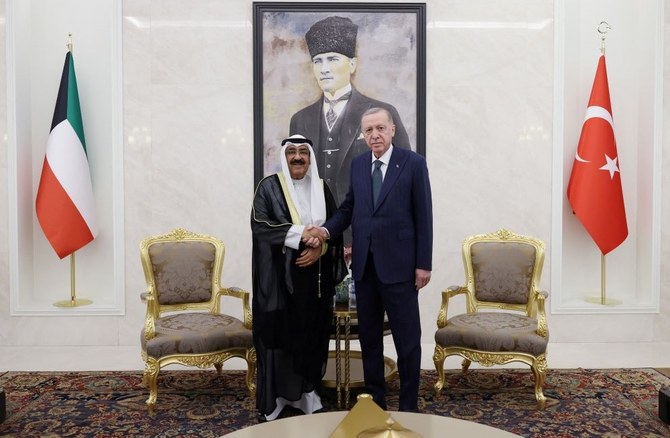
- Partnerships with Gulf countries ‘are win-win moves economically, politically’ for Ankara, analyst tells Arab News
- Visit is significant as it is Sheikh Meshal’s first to a non-Arab country since taking office in December
ANKARA: Turkiye and Kuwait recently strengthened their bilateral relations by signing six cooperation agreements in the fields of defense, trade, energy, tourism, health and diplomacy during Kuwaiti Emir Sheikh Meshal Al-Ahmad Al-Sabah’s visit to Ankara, where he was received by Turkish President Recep Tayyip Erdogan in a grand state ceremony.
These agreements, including a protocol on defense procurement and a memorandum of understanding on strategic dialogue, followed discussions between the leaders and their delegations.
The visit is significant as it is Sheikh Meshal’s first to a non-Arab country since taking office in December, and coincides with the 60th anniversary of diplomatic relations between Turkiye and Kuwait.
Eyup Ersoy, a visiting fellow in the Department of International Relations at the London School of Economics and Political Science, said that the progress in bilateral relations is bound to have an impact on regional politics.
“There is a recently revived Turkish interest in developing its relations with the states of the region which are keen to adopt a neutral position in the polarized regional geopolitics. Accordingly, there seems to be a cluster of countries in the Middle East that are trying to stay out of the entanglements of regional geopolitics,” he told Arab News.
“With the consolidation of Turkish-Kuwaiti relations, this nonaligned axis is expected to establish itself as a third alternative in the polarized region. In this regard, the signing of a strategic dialogue agreement signifies the commitment of the two states to align their regional policies.”
According to Turkiye’s Ambassador to Kuwait, Tuba Nur Sonmez, who spoke to Kuwait’s state news agency KUNA, the visit included discussions on bilateral relations and regional issues such as the Israel-Hamas conflict.
Both countries aim to increase their trade volume to $1 billion from $688 million last year, with Turkish exports to Kuwait exceeding $583 million last year. In addition, Kuwait sealed a $367 million deal with Turkish drone manufacturer Baykar to buy TB2 armed drones in 2023.
According to Ersoy, the defense industry supply agreement signed during the visit indicates a mutual interest in advancing defense industry cooperation between the two states.
“The content of the actual transactions will be determined by the Kuwaiti leadership’s assessment of Kuwait’s defense industry needs and the extent to which Turkiye could supply relevant defense industry products,” he said.
However, Ersoy said that trade volume between the two countries is not high compared with their other trading partners.
“For example, in 2022, Turkiye ranked 19th among Kuwait’s export destinations, while Kuwait ranked only 56th for Turkish exports,” he said.
“Therefore, both sides are keen to strengthen their trade relations, as indicated by the statement during the visit on the need to revitalize the Joint Economic Commission.
“In addition, Kuwait’s leadership is seeking to diversify its economy in line with its Vision 2035 strategy, as its revenues are almost entirely based on the export of hydrocarbons. Increased trade with Turkiye has the potential to contribute to this ambitious macroeconomic goal,” Ersoy said.
Kuwaiti direct investment flow in Turkiye, which stood at $2 billion last year, has also continued, reaching $1.5 billion so far this year.
“More Kuwaiti participation in the Turkish economy, especially through direct and portfolio investment, is imminent,” said Ersoy.
Kuwait is also expected to take steps to reduce its trade imbalance with Turkiye, he added.
In the tourism sector, Istanbul broke a 10-year record last year with a surge of Gulf tourists visiting the city. Trabzon, Bodrum, and Izmir are other top destinations for Kuwaiti tourists visiting Turkiye during the summer.
However, Arab visitors have been the targets of sporadic attacks amid anti-Arab sentiment in Turkiye. Last year, a Kuwaiti tourist was attacked in the northern city of Trabzon.
Betul Dogan Akkas, an assistant professor of international relations at Ankara University, said bilateral relations between Turkiye and Kuwait were based on mutual respect and trust, stemming from a historical and diplomatic legacy.
“There is capital in these relations to promote cooperation, especially in the economic sphere, including the defense industry,” she told Arab News.
“Kuwait is open to consolidating its trade, and for Ankara, partnerships with Gulf countries are win-win moves both economically and politically.
“The key aspect in analyzing these relations is the current willingness of both sides to build long-term goals. So far, we have seen mostly reactionary or short-term economic and political moves,“ Dogan Akkas said.
“Now is the right time for relations to institutionalize diplomatic capital. This requires leadership support, and both parties have it, as the emir of Kuwait visited Turkiye as his first non-Arab trip.”
Dogan Akkas also believes that the level of success and structure of political decision-making are crucial to strengthening relations.
She said that Turkiye’s ambassador to Kuwait is using her position to “achieve a comprehensive and well-structured long-term goal.”
Another question about this visit is the significance of its timing.
Ersoy believes that the Turkish president’s recent visit to Iraq appears to have eased a source of tension in Gulf politics by demonstrating Ankara’s willingness to cultivate more constructive and cordial relations with a critical neighbor of Kuwait.
“Turkiye’s receptiveness to regional political dialogue and economic prosperity has shaped the Kuwaiti leadership’s assessments in strengthening Kuwait’s ties with Turkiye,” he said.
Kuwait recently showed unease at being left out of the development road project linking Iraq to Turkiye and the Gulf states. During Erdogan’s recent visit to Iraq, Ankara secured the signing of a quadrilateral memorandum of understanding between Iraq, Qatar, the UAE, and Turkiye.
However, the project, which will significantly boost regional transport, will be launched from Iraq’s Faw port, adjacent to Kuwait’s Mubarek port, whose delayed completion has been criticized in Kuwait.
But there was no mention of this unease during the visit to Ankara.
In addition, Ersoy said, national security imperatives appear to have contributed to the recent visit.
“Kuwait’s neutrality in the regional struggle does not guarantee immunity from coercive diplomacy or punitive strategies in a militarized and highly volatile region,” he said.
“Therefore, exploring and building a security partnership with Turkiye appears prudent for the Kuwaiti leadership, which is another reason for the recent high-level visit.”
In this context, Dogan Akkas underlined the importance of the regionalizing their cooperation.
“If Kuwait and Turkiye take their cooperation to a regional or subregional level, as leaders in certain regional affairs, the political capital will be properly implemented,” she said.
Remarks underscore a growing rift on Gaza war between the US and its strongest ally in the Middle East
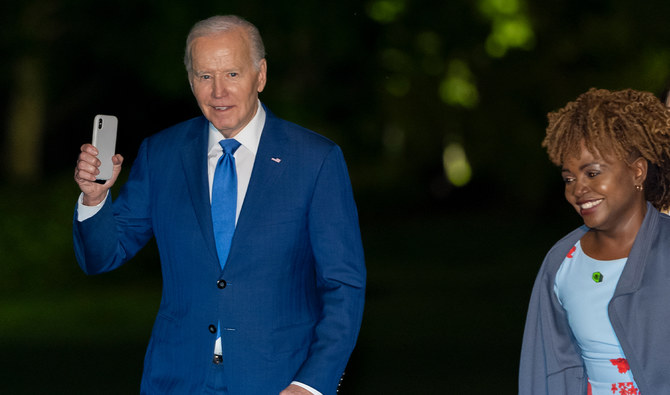
- Biden’s comments represent his strongest public language to date in effort to deter Israeli assault on Rafah
- Remarks underscore a growing rift on Gaza war between the US and its strongest ally in the Middle East
President Joe Biden on Wednesday publicly warned Israel for the first time that the US would stop supplying it weapons if Israeli forces make a major invasion of Rafah, a refugee-packed city in southern Gaza.
“I made it clear that if they go into Rafah ..., I’m not supplying the weapons that have been used historically to deal with Rafah, to deal with the cities – that deal with that problem,” Biden said in an interview with CNN.
Biden’s comments represent his strongest public language to date in his effort to deter an Israeli assault on Rafah while underscoring a growing rift between the US and its strongest ally in the Middle East.
Biden acknowledged US weapons have been used by Israel to kill civilians in Gaza, where Israel has mounted a seven-month-old offensive aimed at annihilating Hamas. Israel’s campaign has so far killed 34,789 Palestinians, mostly civilians, the Gaza Health Ministry said.
“Civilians have been killed in Gaza as a consequence of those bombs and other ways in which they go after population centers,” he said when asked about 2,000-pound bombs sent to Israel.
Israel this week attacked Rafah, where more than one million Palestinians have sought refuge, but Biden said he did not consider Israel’s strikes a full-scale invasion because they have not struck “population centers.”
A senior US official, speaking on condition of anonymity, said Washington had carefully reviewed the delivery of weapons that might be used in Rafah and as a result paused a shipment consisting of 1,800 2,000-pound (907-kg) bombs and 1,700 500-pound bombs.
The interview was released hours after Defense Secretary Lloyd J. Austin III acknowledged publicly Biden’s decision last week to hold up the delivery of thousands of heavy bombs was taken out of concern for Rafah, where Washington opposes a major Israeli invasion without civilian safeguards.
Israel’s campaign in Gaza was triggered by Hamas ‘ Oct. 7 attack on Israel. That killed about 1,200 people with about 250 others abducted, of whom 133 are believed to remain in captivity in Gaza, according to Israeli tallies.
Biden said the US would continue to provide defensive weapons to Israel, including for its Iron Dome air defense system.
“We’re going to continue to make sure Israel is secure in terms of Iron Dome and their ability to respond to attacks that came out of the Middle East recently,” he said. “But it’s, it’s just wrong. We’re not going to – we’re not going to supply the weapons and artillery shells.”
First shipment of aid to the US-built floating pier in Gaza departs from Cyprus
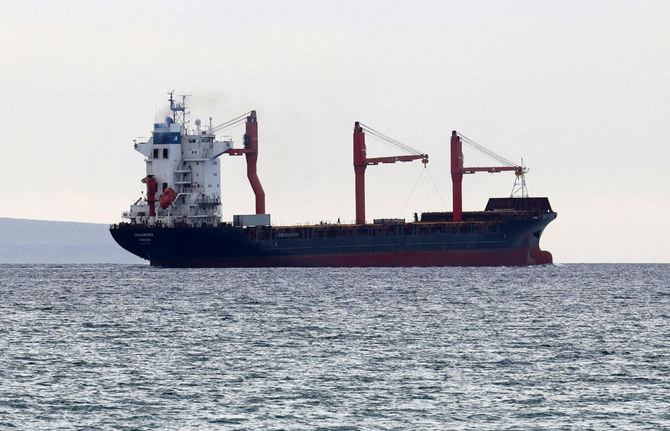
- The US vessel, loaded with much needed humanitarian assistance, departed from the Larnaca port
NICOSIA, Cyprus: A shipment of humanitarian aid has left a port in Cyprus and is on its way to the US-built pier in Gaza, the first delivery to the newly built ramp, Cyprus’ foreign minister said Thursday.
The US vessel, loaded with much needed humanitarian assistance, departed from the Larnaca port with the aim of transferring as much aid to Gaza as possible through the maritime corridor, said Foreign Minister Constantinos Kombos.
The trip comes some two months after US President Joe Biden gave the order to build the large floating platform several miles off the Gaza coast that will be the launching pad for deliveries.
The relief is desperately needed, with the United Nations saying people in Gaza are on the brink of famine and as Israeli troops ordered the evacuation of 100,000 Palestinians from Gaza’s southern city of Rafah.
Earlier this week, Israel sent tanks to seize the nearby Rafah crossing with Egypt, shutting down a vital crossing needed to get assistance into the battered enclave.
It remains uncertain whether Israel will launch an all-out invasion of Rafah as international efforts for a ceasefire continue. Israel has said an assault on Rafah is crucial to its goal of destroying Hamas after the militant group’s Oct. 7 attack on southern Israel that left 1,200 dead and 250 as hostages in Gaza.
The United States, which opposes a Rafah invasion, has said Israel has not provided a credible plan for evacuating and protecting civilians. The war has killed over 34,800 Palestinians, according to Gaza health officials, and has driven some 80 percent of Gaza’s population of 2.3 million Palestinians from their homes.
Humanitarians said aid coming by sea won’t be enough to alleviate the dire humanitarian suffering in Gaza and that the most effective way to get assistance in is by land.
The closure of the Rafah crossing and the nearby Kerem Shalom crossing this week cut off the entry of food, supplies, and fuel for aid trucks and generators. Aid groups warn they have only a few days of fuel before humanitarian operations and hospitals around Gaza begin to shut down.
Israel said Wednesday it reopened Kerem Shalom, which was shut after Hamas mortars killed four Israeli soldiers nearby, but aid groups said no trucks were entering the Gaza side.
Trucks let through from Israel must be unloaded and the cargo reloaded onto trucks in Gaza, but no workers in Gaza can get to the facility to do so because it is too dangerous, the UN says.
Israeli strike on Lebanon kills four Hezbollah fighters, security sources say
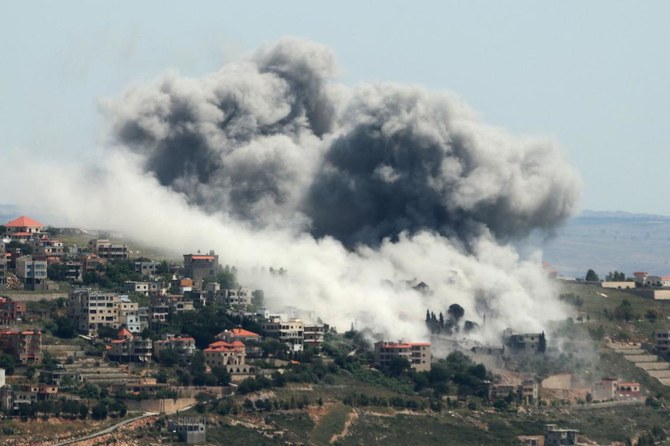
- Israeli military did not immediately comment on Thursday’s strikes
- Lebanon’s civil defense rescue force said it had pulled four bodies out of a car that had been scorched by an Israeli strike
BEIRUT: An Israeli air strike on a car in southern Lebanon killed four people on Thursday, according to Lebanon’s civil defense, with security sources saying those killed were members of armed group Hezbollah.
The conflict between Hezbollah and Israel has rumbled on since October in parallel to the Gaza war, with an escalation this week as both sides intensified their bombardment, fueling concern of a bigger war between the heavily-armed adversaries.
Israel has used artillery, drones and warplanes against targets in southern Lebanon, including to strike fighters from Hezbollah and other armed groups. Fighters in Lebanon have launched rockets and their own drones into northern Israel.
The Israeli military did not immediately reply to a request for comment on Thursday’s strikes.
Lebanon’s civil defense rescue force said it had pulled four bodies out of a car that had been scorched by an Israeli strike. Two security sources told Reuters the four killed were members of Hezbollah.
The exchanges of fire have uprooted tens of thousands of people on both sides of the border. In northern Israel, the displacement has prompted calls for firmer military action against Hezbollah.
Israeli Defense Minister Yoav Gallant warned on Wednesday that the next months “may be a hot summer,” saying either a diplomatic deal or military solution was needed to restore security.
The fighting between Israel and Hezbollah has been the most intense since they went to war in 2006.
Hezbollah has repeatedly said that it will cease fire when the Israeli offensive in Gaza stops, but that it is also ready to fight on if Israel continues to attack Lebanon.



